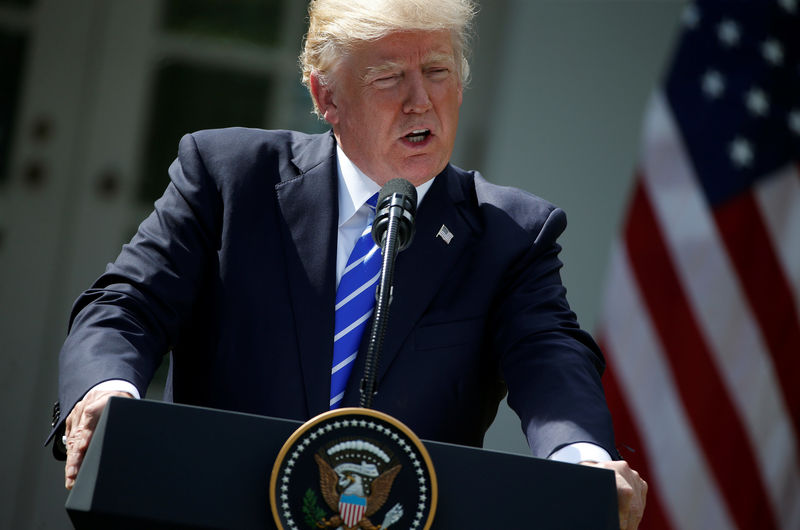By Jeff Mason and Susan Cornwell
WASHINGTON (Reuters) - President Donald Trump, faced with the latest Republican failure to undo Obamacare, pledged on Wednesday to tackle it again next year, suggesting without evidence that he had the votes to pass reform and promising to work with Democrats in the meantime.
Trump told reporters at the White House that he also was working on an executive order, possibly to be signed next week, that would allow individuals to buy health insurance across state lines.
Senate Republicans abandoned their latest effort to repeal former President Barack Obama's Affordable Care Act on Tuesday after failing to secure sufficient support from fellow Republicans.
Trump said there would be another vote on healthcare in the first few months of 2018 and he would work with Democrats to make the effort more bipartisan. Democrats strongly oppose repealing and replacing Obama's signature domestic policy achievement.
"I am ... going to meet with Democrats and I will see if I can get a healthcare plan that's even better," Trump said. "So I will negotiate with Democrats, but from the Republican standpoint, we have the votes. We'll vote in January, February or March."
Trump did not explain the discrepancy between his conviction that the votes were there and the fact that not enough Republican senators supported the latest bill, forcing Republican leaders to scrap plans to hold a vote.
Republicans control the Senate by a 52-48 margin.
The bill's sponsors vowed to try again but face steeper odds after Saturday, when special rules expire that allow them to pass healthcare legislation without Democratic support.
Trump told reporters that one of the votes they needed was of a senator who was in the hospital, Senator Thad Cochran of Mississippi. Cochran's office said the senator was not in the hospital but was recovering after being treated for a "urological issue."
Republican Senators John McCain, Susan Collins and Rand Paul opposed the bill.
ACROSS STATE LINES
Paul has encouraged Trump to legalize nationwide health associations, which he says would allow people to get group health insurance across state lines. Trump said he was working on a measure to do that.
"I am considering an executive order on associations and that will take care of a tremendous number of people with regard to healthcare and I'll probably be signing a very major executive order where people can go out, cross state lines, do lots of things and buy their own healthcare," Trump said.
He said the order was in the process of being finished. The effort appeared to be a move to woo Paul. Trump said later he thought the senator from Kentucky would come around on the broader push for legislation.
"I think Rand will be there for us," Trump told reporters.
UCLA Professor Mark Peterson expressed doubt that insurance prices would be reduced by selling across state lines because insurers would still be subject to ACA regulations requiring coverage of hospital care, prescription drugs, pregnancy and childbirth needs and mental health services.
"What drives cost of care is the cost of medical care. If I’m in California, which is an expensive medical care state and I buy my insurance from Delaware, which is not, I’m still going to doctors and hospitals that are very expensive and the insurance plan is either going to cover that or not," he said.
Congressional leaders said on Tuesday they were moving on to tax reform legislation. But the Senate's No. 2 Republican, John Cornyn, said on Wednesday that lawmakers would continue to work on healthcare. He said the authors of the most recent Obamacare repeal bill, Senators Lindsey Graham and Bill Cassidy, hoped to increase support for their proposal.

Republican Senator Lamar Alexander and Democrat Patty Murray resumed their bipartisan talks on Wednesday seeking a deal to help stabilize health insurance markets, a Murray spokeswoman said. She had no details. Alexander chairs the Senate health committee and Murray is the panel’s top Democrat.
(additional reporting by Richard Cowan, Susan Heavey, Makini Brice, Doina Chiacu and Michael Erman; Editing by Bill Trott and Cynthia Osterman)